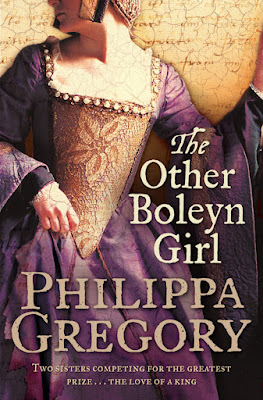Book #61
Mary Boleyn catches the eye of Henry VIII when she comes to court as a girl of fourteen.Dazzled by the golden prince, Mary's joy is cut short when she discovers that she is a pawn in the dynastic plots of her family. When the capricious king's interest wanes, Mary is ordered to pass on her knowledge of how to please him to her friend and rival: her sister, Anne.Anne soon becomes irresistible to Henry, and Mary can do nothing but watch her sister's rise. Anne stops at nothing to achieve her own ambition. From now on, Mary will be no more than the other Boleyn girl. But beyond the court is a man who dares to challenge the power of her family to offer Mary a life of freedom and passion. If only she has the courage to break away - before the Boleyn enemies turn on the Boleyn girls.
Despite my apathy towards modern royal goings on, and my reluctance to accept we even require a monarchy, I’ve always had a grim fascination with the Tudor reign, particularly Henry and his six wives. This was exacerbated a few years ago by a trip to the theatre to see Six, and ever since then I’ve been eating up all I can.
The Other Boleyn Girl captivated me as it explores the life of another woman who was horribly impacted by Henry, but managed to escape matrimony - Mary Boleyn, Anne’s sister. The first of the Boleyns to be thrust upon the king as an object, a pawn in the Boleyn family’s aspirations to greatness. Her story is wonderfully filled with heartbreak, wavering loyalties, politics, and ambition; Gregory tells it perfectly.
So much scheming with such a lack of familial care, both Anne and Mary were used terribly by the family, and it’s interesting to see the contrast between their values and purpose. Mary was placed in front of the king as a mistress, a plaything which would allow the Boleyns a better place in court, front facing and important. She falls deeply in love with the king, bearing him two illegitimate children, after which the family place Anne under the king’s gaze instead. She behaves much differently, playing him for everything, encouraging him to divorce his wife and marry her instead, all done with a coldness of manipulation which reveals no love, only ambition.
All of the differing levels of deceit here are so engrossing, the measures the characters are willing to take seem awfully extreme. Aligned with the politics of war, Gregory has created a story which reminds us these were real people, no matter how the passage of time might turn them into caricatures, their lives and flaws were genuine.
This is such a wonderful fictionalisation (important to note it’s a work of fiction so history geeks don’t get their knickers in a twist) of a very dangerous and terrifying time in England. It’s quite impossible for me to construct sentences which can really depict how much I loved this book - it’s a voyeur’s dream into the lives of those at court under Henry VIII.

